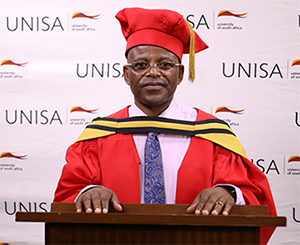College of Science, Engineering & Technology
Simplifying mathematical models to solve societal problems

Prof Melusi Khumalo
Prof Melusi Khumalo, Chair of the Department of Mathematical Sciences in the College of Science, Engineering and Technology, recently delivered his inaugural lecture entitled "Computational methods with applications to mathematical models".
Khumalo started his lecture by sharing insights on mathematicians’ fascination with understanding day-to-day natural occurrences by drawing up mathematical models to understand these natural occurrences. Khumalo explained: "Mathematical models are a language used by mathematicians through which certain phenomena can be understood. A significant portion of life is made up of natural phenomena that can be physical, engineering, or medical phenomena, such as the flow of blood in arteries, or the flow of fluid in pipes." He added: "Mathematicians can construct mathematical models in order to understand these natural phenomena. From their observation, natural phenomena are generally represented by nonlinear models that are difficult to solve and interpret."
Against this background, Khumalo’s research group embarked on designing computational methods to find approximate solutions to real-world problems. In their case, the use of computational methods is more favourable than exact methods, which tend to have a number of limitations. The approximate solutions obtained are then interpreted in an attempt to understand what is happening in the natural environment. What becomes critical in Khumalo’s research is the interrogation of the existence, uniqueness and smoothness of the approximate solutions.
The mathematical models in which Khumalo’s computational methods are applied can be represented by what is known as functional equations. These functional equations can be in the form of differential equations, integral equations, or both. Some notable uses of integral equations are modelling the spread of epidemics in a population. Khumalo said: "We have just come through an epidemic in the form of Covid-19. These integral equations are essential in modelling the spread of the virus in population dynamics. We can see that the problems addressed do not merely arise from the minds of mathematicians, but they are real-world problems, which can be modelled by the equations and solved numerically or computationally."
Peer praise
Responding to Khumalo’s inaugural lecture, Prof Sandile Motsa, Executive Dean of the Faculty of Science and Engineering at the University of Eswatini, praised the contribution and the impact Khumalo’s research has made in the field of science. Motsa said: "One of the prominent contributions that Khumalo and his collaborators have made is in the area of time-dependent initial value problems. A typical model for an initial value problem that models real-life phenomena would typically be very complex and involve many variables that interact with each other in complex and nonlinear ways. For example, a model that tracks the spread of Covid-19 in the community over time would have many variables, including the infected population, vaccinated population, unvaccinated population, those infected but vaccinated, and those with comorbidities." Motsa asserted: "In your model, all these variables would have to be captured as they all contribute to the number of cases and death. The model would be very large and complex as all the variables interact."
Motsa applauded Khumalo and his research group for introducing innovative ways of simplifying such models through linearising the models and introducing methods of solving the problem in multiple domains. "A problem is then solved in digestible ways," he remarked.
It is noteworthy that Khumalo’s pioneering research in the area of time-dependent initial value problems has inspired many other researchers to develop their methods.
Khumalo has been rated as a C3 scholar by the National Research Foundation, has published more than 32 accredited publications in reputable journals, and has contributed one book chapter. In addition, he has supervised eight master’s degree and three doctoral students to completion. Khumalo’s field of specialisation is centred on computational methods and numeral analysis, with applications in dynamical systems, fluid flow and fractional calculus.
He has presented his research at several international and local conferences that are highly regarded in the field of mathematics. Khumalo has participated as a member of the South African Mathematical Society, the Canadian Applied and Industrial Mathematics Society, and the Society for Industrial and Applied Mathematics.
In future, Khumalo plans to extend his approach to solving four-dimensional problems (in large matrices with four variables that are difficult to invert), applying the approach to fractional differential equations and modifying the approach to accommodate differential equations with periodic boundary conditions. He ended his lecture by thanking his collaborators and mentors who contributed to his research success over the years.
* Compiled by Dr Nozipho N Gumbi, Acting Communication and Marketing Specialist, College of Science, Engineering and Technology
Publish date: 2022/06/07

 Unisa co-hosts G20 community outreach in the Eastern Cape
Unisa co-hosts G20 community outreach in the Eastern Cape
 Unisans gain membership of prestigious science academies
Unisans gain membership of prestigious science academies
 Advocating for disability transformation through servant leadership
Advocating for disability transformation through servant leadership
 Unisa Press continues to illuminate the publishing space
Unisa Press continues to illuminate the publishing space